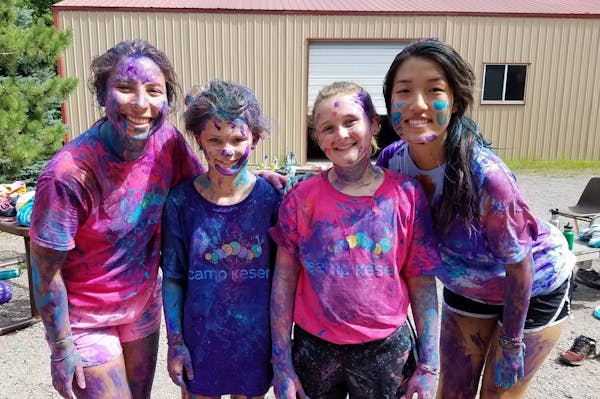Don't worry. It's hard to be happy, consumed as we are by polarizing politics, the neighbor's over-the-top vacation posts, traffic nightmares, suffocating college debt and shrinking financial safety nets. But we can reclaim some childlike happiness if we learn to better manage these very real challenges. After years of observing clients — and themselves — grow increasingly unhappy, Twin Cities business executives Nancy O'Brien and Linda Saggau founded the Happiness Practice (experiencehappiness.biz). Sure it sounds new agey, until you learn that Fortune 500 companies who use it report more collaborative, productive and, yep, happy workers. They say we, too, can benefit.
Q: Fifty people came to your recent "Happiness 101" seminar on a weeknight during the dinner hour; not an easy time to get away. Clearly, people are hungry for help. Why?
A: Stress has been called the "health epidemic of the 21st century" by the World Health Organization. A 2014 study found 48 percent of Americans saying their stress has increased over the last five years. These soaring stress levels are contributing to the high number of unhappy people seeking ways to feel better. The good news is that once the effects of stress and burnout are reduced even a little bit, it gets a lot easier to dramatically increase personal happiness.
Q: So, the opposite of happiness is not sadness; it's burnout?
A: Yes. The feelings and behaviors of people experiencing the opposite of serenity and excitement mirror the physical, emotional and behavioral signs of burnout. Sadness is fleeting. Unhealthy stress is erosive. Unless addressed, it tends to worsen.
Q: But, 30 days to a happier us? It sounds improbable.
A: The emphasis of our 30-Day Happiness Practice is redefining happiness. That alone typically reduces stress and enhances happiness in under 30 days. But THP's five principles, which include releasing control, typically are practiced over six months to allow enough time for the formation of new neural pathways and integration of new habits. One major Twin Cities healthcare organization followed our practice and reported burnout down 22 percent and employee happiness up 16 percent. Patient satisfaction increased, too, by 5.3 percent.
Q: Do we even know what happiness is? Do we confuse it with other things?
A: When we began this work 12 years ago we, like a lot of people, defined happiness as constant "positivity" or something that was largely externally driven, such as a bigger home, better car, promotion or weight loss. We learned that these definitions can be dangerous. Humans are not "wired" to be positive all the time, and the unrealistic expectation that we must be so sets up people for frustration and failure. And if you make your happiness contingent on outside forces, you become what we call a "happiness hostage" — someone who cannot be happy until certain people, events or things change. Giving outside forces that much power puts your happiness predominantly on hold. It's not a fun or wise way to live.
Q: Do you find men or women more likely to place happiness outside themselves?
A: Men, especially, make their happiness contingent on outside forces. For too long, men have received the cultural message that "the more you produce, the more valid you are." This has resulted in generations of men identifying most of their self-worth with jobs, incomes and status. That's unfair and unfortunate. Fortunately, a lot of men are ready to shift that old paradigm.
Q: How do you define happiness?
A: "The innate ability to locate and cultivate serenity and excitement about your life regardless of outside forces." We like it because it's achievable, satisfying and practical. It also creates a continual invitation to reframe events and outcomes to feel more consistently centered, no matter what life may present.
Q: Were people happier at other times in our history?
A: A Centre for Competitive Advantage in the Global Economy report found that people living in 1957 were happier than people are today. The report emphasized that happiness is relative, depending on things like expectations and aspirations. If those are much higher today than decades ago, it could be why so many people are unhappy now.
Q: Tell us about a few genuinely happy people you know.
A: One is a janitor in an elementary school who "decided to love himself well so he could love the kids well." He learned the name of every child and took sincere interest in them. Tears of gratitude were shed the day he retired. Another is our friend, Ann, who died suddenly almost five years ago. She had this amazing, innate ability to be totally present. But the happiest people we know are young children. They naturally understand how to be simultaneously serene and excited about life, regardless of outside forces.
Q: On the other end, some studies suggest that people 70 and older are the happiest. Why might this be true?
A: Emotional intelligence is likely to increase with age, which tends to help people feel more satisfied overall. Some research shows that older people may have a greater ability to live in the present and be accepting. Not all older people have this down pat, but the concept of releasing control is essential to happiness.

Motormouth: Oil type not an issue

Brides trade boozy parties for wellness retreats




